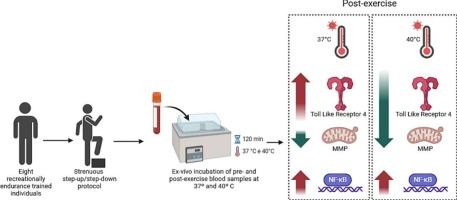Effects of acute heat exposure on monocyte phenotype following exhaustive exercise: An ex vivo study
IF 3.7
3区 医学
Q2 BIOCHEMISTRY & MOLECULAR BIOLOGY
引用次数: 0
Abstract
Background/Aim: This study aimed to evaluate the effects of ex vivo whole blood heat therapy on monocyte inflammatory response following exhaustive exercise in young individuals. Methods: Eight recreationally endurance trained individuals (27.2 ± 3.1 years old, VO₂Peak 53.1 ± 2.1 mL/kg/min) performed a strenuous step-up/step-down protocol until exhaustion. Blood samples were collected pre and post exercise and incubated 37 °C or 40 °C during 2 h. Flow cytometry was used to assess TLR-4 expression, NF-kB activation, mitochondrial membrane potential and TNF-alpha expression in CD14+ monocytes. Results: Post exercise, TLR-4 expression and NF-kB activation increased at 37 °C (p < 0.001), but heat therapy at 40 °C significantly reduced these responses (p < 0.01). MMP decreased after exercise at both temperatures but was significantly lower at 37 °C than 40 °C (p < 0.05). TNF-a levels showed a trend toward returning to baseline with heat therapy. Conclusion: Ex vivo heat therapy reduces monocyte mediated inflammation after exercise, induced muscle damage, suggesting its potential as a recovery strategy to strenuous exercise sessions.

急性热暴露对穷尽运动后单核细胞表型的影响:一项离体研究
背景/目的:本研究旨在评估体外全血热疗法对年轻人穷竭运动后单核细胞炎症反应的影响。方法:8名娱乐性耐力训练者(27.2±3.1岁,VO 2峰值53.1±2.1 mL/kg/min)进行剧烈的升/降训练,直至精疲力竭。运动前后采集血样,37℃或40℃孵育2 h。流式细胞术检测CD14+单核细胞TLR-4表达、NF-kB活化、线粒体膜电位和tnf - α表达。结果:运动后,TLR-4表达和NF-kB激活在37°C升高(p <;0.001),但40°C的热处理显著降低了这些反应(p <;0.01)。在两种温度下运动后,MMP均下降,但在37°C时显著低于40°C (p <;0.05)。TNF-a水平在热疗后呈回归基线的趋势。结论:体外热疗法可减少运动后单核细胞介导的炎症,引起肌肉损伤,提示其可能作为剧烈运动后的恢复策略。
本文章由计算机程序翻译,如有差异,请以英文原文为准。
求助全文
约1分钟内获得全文
求助全文
来源期刊

Cytokine
医学-免疫学
CiteScore
7.60
自引率
2.60%
发文量
262
审稿时长
48 days
期刊介绍:
The journal Cytokine has an open access mirror journal Cytokine: X, sharing the same aims and scope, editorial team, submission system and rigorous peer review.
* Devoted exclusively to the study of the molecular biology, genetics, biochemistry, immunology, genome-wide association studies, pathobiology, diagnostic and clinical applications of all known interleukins, hematopoietic factors, growth factors, cytotoxins, interferons, new cytokines, and chemokines, Cytokine provides comprehensive coverage of cytokines and their mechanisms of actions, 12 times a year by publishing original high quality refereed scientific papers from prominent investigators in both the academic and industrial sectors.
We will publish 3 major types of manuscripts:
1) Original manuscripts describing research results.
2) Basic and clinical reviews describing cytokine actions and regulation.
3) Short commentaries/perspectives on recently published aspects of cytokines, pathogenesis and clinical results.
 求助内容:
求助内容: 应助结果提醒方式:
应助结果提醒方式:


